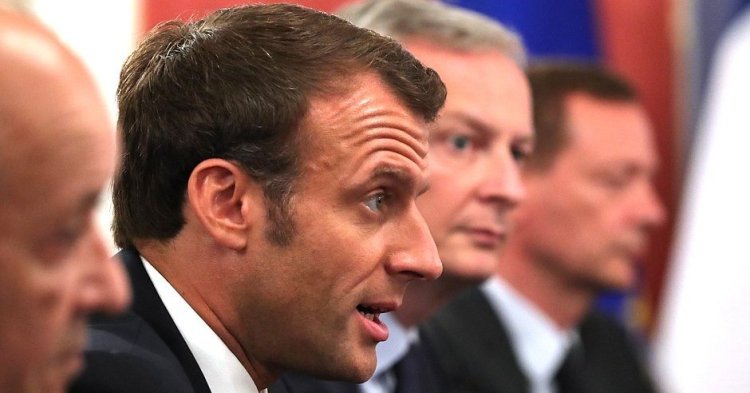STRASBOURG, Sunday 28th June, 7.30pm. A buzz of activity swells from the terrace of Café Bâle as it spills out across one of the Alsatian capital’s most famous squares. Campaigners from Macron’s “La République En Marche” (LREM) and the right-wing Republicans, who joined forces in Strasbourg to try to get Macron-backer Alain Fontanel elected, are gathering for the results. Elsewhere across the city, activists for the socialist candidate Catherine Trautmann and the ecologist Jeanne Barsegihan must also be exchanging door-steps for bars. It’s election night: nerves are running high. The winner here will govern the city of Strasbourg for the next six years.
The results are in: a surprise hands-down victory for Barseghian and the Greens with more than 40% of the vote share. This trend is echoed across the country: better than expected results for the Greens, a failure to meet expectations for LREM, especially in places like Strasbourg where they associated themselves with the right. It was a second round blighted by a coronavirus-induced delay and record abstention. Important take-away messages can nonetheless be garnered on the state of the French political landscape.
Beyond the green wave: a sea of blue
Building on the strong results notched up in the European elections (13.5% of the vote), the Greens conquered several important metropoles for the first time, including Strasbourg, Lyon and Marseille. The socialist mayor of Paris, Anne Hidalgo, was also emphatically reelected with the support of the Greens.
Despite their European and now local success, the Greens remain almost unrepresented at the national level - arguably, the level that is the most influential in terms of policy outcomes. The Greens’ results represent a successful step forward, but the idea “green wave”, when we consider the sea of blue of the Republicans and right-wing alliances behind it, is somewhat of an exaggeration.
The results show that, while younger, urban populations more commonly engaged in professional occupations and based in France’s most international cities may be convinced of the need for a green transition, rural populations are less so. This highlights a future challenge for the Green party, but also for Macron. Indeed, the “yellow vests” movement, initially triggered by a rise in fuel tax which disproportionately impacted those in rural communities, is an indication that a green transition cannot be achieved if the needs of less prosperous communities are not accounted for.
Macron’s centrist movement - from alternative to mainstream
Successfully branding as an “alternative” to the existing mainstream parties in the first round of the 2017 presidential elections, Macron harnessed voters’ frustration with the Socialist Party of François Hollande and the right-wing Les Républicains to forge a new path in the centre ground. However, the hot-off-the-press results in the municipal elections last Sunday are hardly a ringing endorsement for what Macron has achieved since.
The alliance with Les Républicains in many seats for the second round, and, in the midst of the government reshuffle, the appointment of a new Prime Minister who, like his predecessor, is firmly anchored to the right, essentially shows that Macron has largely given up on defending his self-proclaimed centrism. His attempts at reforming pensions, various public companies and the labour market have anyway left him on the right side of the left-right cleavage he sought to overcome. It also shows that voters now firmly see his party as the establishment - Macron has become the mainstream from which he wanted to depart. The poor scores nationally might reflect the lack of local presence of the young party, as many claim - but they also represent a temperature check on the perceived success of the presidency up to this point and reflect the scepticism in which France beholds its government’s response to the coronavirus crisis - 66% are dissatisfied.
Macron may retain his influence and admiration across Europe - the recent Franco-German proposition for funding a bold recovery package is the most recent example of his ambition to drive Europe forward - but domestically, the shine of his appeal continues to fade.
A tale of one city
Grabbing the headlines for the Rassemblement National (RN, formerly Front National) of Marine Le Pen was the victory in Perpignan, a medium-sized city hugging the south-east coast near the Spanish border. However, a closer look reveals that the RN, along with the LREM, is a double loser of these elections. Firstly, successful far-right candidates, including Louis Aliot in Perpignan, chose to distance themselves from the RN label and took care to skirt some of the most controversial sections of the Le Pen agenda, insteading focussing on local issues and regional identity. Secondly, the RN achieved only 58% of the council seats it won during the last local elections in 2014.
It’s a knock to the party which, following the absorption of Macron and his movement into the image of the establishment, might have hoped to jostle into the top spot of the non-mainstream alternatives, especially by playing on frustrations whipped up by the coronavirus crisis.
Fillon convinced of fraud
The former Prime Minister and former head of the Republicans François Fillon was last week convicted of diverting public funds to create lucrative yet fictitious jobs for his wife. Faced with two years in prison and hefty fines, he and his wife Penelope plan to appeal.
Whatever the outcome, the scandal and trial have contributed to an erosion of trust in the establishment and reflect badly on LREM candidates who sought alliances with the right. The tainted reputation of Les Républicains does not bode well for a comeback in the next presidential elections in 2022 and may yet reveal a nail in the coffin of the traditional French mainstream. Once again, Macron’s LREM and Le Pen’s RN will be the main national forces.
New headlines, old trends
This particularly action-packed period in French politics should be coming to a close now the new government has been named following the reshuffle. The new top team will act under the direction of Jean Castex, announced three days ago as the new Prime Minister selected to replace Edouard Philippe, in spite of Philippe’s high public approval ratings and a convincing win in the northern town of Le Havre last Sunday. Freshly-appointed Jean Castex is a relatively ill-known politician who is seen to combine connections with the powerful (praised as the orchestrator of a successful slow release from lockdown, he was formerly an advisor to Nicolas Sarkozy) and the local (he has been the popular mayor of a southern town since 2008).
The kerfuffle of the past eight days has done its best to hide a president who is three-fifths of the way through his mandate, hasn’t managed half of what he had planned and already has half an eye on reelection. Macron, as he frequently says himself, wishes to “reinvent” his presidency. With opponents weak and challenges numerous, Macron has every incentive to begin his campaign early. The selection of the unheard of Castex over the successful Philippe, viewed as a potential presidential opponent, undoubtedly reflects these ambitions and strategy.
Macron would do well to heed the calls from the now green metropoles for action on climate change as well as the fear from the countryside about the consequences of this action. With divisions entrenched and many sceptical, much of the gloss has left the Macron movement since the last presidential elections. He won’t need it anyway to win in 2022.



Follow the comments: |
|
